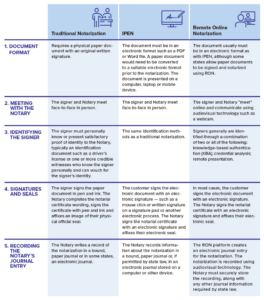Montana is now among 13 states allowing online or remote notary services. The change was approved in the 2019 legislative session through House Bill 370, which was sponsored by Rep. Becky Beard, R-Elliston. It passed the House 69-29 and the Senate 49-0.
The law went into effect on October 1, 2019, allowing notaries to perform remote or online notary services through audiovisual communication such as Zoom and also utilizing a notary platform designed by third party administrators and approved by the state of Montana. The personal appearance requirement for the signer and the notary is done through a live, two-way, audio-visual communication and standards have been established for the technology. Issues of security and data protection have been addressed to the state and the general public’s satisfaction. Documents can be digitally signed, notarized, and transmitted in minutes, 24 hours a day, and every day of the year. This put Montana on the leading edge of technology-based notarizations and provides Montana businesses with reliable, credible, and convenient notary services to clients. Silverman Law Office offers this service to its clients.
Remote on-line notarization (RON) can be used personally and by all businesses including banks, credit unions, title companies, lawyers, contractors, real estate agents, as well as the military and most federal, state, and local governments. At Silverman Law, our remote notary services have more recently extended to those in the military in Afganistan during times of conflict for them and to out of state law firms in large cities such as California looking for notary services outside of their ability to find anyone meeting in-person to obtain them. The process for getting a notarization on a document hasn’t changed in hundreds of years until recently and even more so since the emergence of the Coronavirus pandemic and social distancing requirements.
Lori Hamm is the notary program specialist for the Montana Secretary of State’s office. It is currently understood that this law changes lives for some Montanans. Notaries are needed for documents such as powers of attorney, department of labor contractor forms, home mortgages, lending documents, real estate documents, and estate planning, to name a few.
The use of technology in notarizations has caused confusion for many people, including Notaries. There is remote online notarization (RON), which is different from in-person electronic notarization (IPEN). And both are different from traditional, pen-and-paper notarization. Following is a step-by-step look at the differences between these notarization methods. This is a general description, and requirements in some states may vary. In Montana, the notary is required to use an exact copy of their seal/stamp and a photocopy of their “wet” signature.

